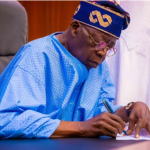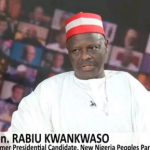He has been a voice against inhumanity, insisting that “Justice is the first condition of humanity,” prompting Henry Louis Gates Jr. to say that: “If the spirit of African democracy has a voice and a face, they belong to Soyinka”. I join the rest of the world to celebrate a persona who by every stretch of measurement has enriched our civilisation, even beyond words. As the Nobel Academy noted in 1986, Soyinka, “in a wide cultural perspective and with poetic overtones fashions the drama of existence.”...READ THE FULL ARTICLE HERE ▶▶
Early in July 2005, just a week before Professor Wole Soyinka turned 71, my boss and mentor, Dapo Olorunyomi, recalled me to Lagos from Port Harcourt, where I was serving as the Regional Media Researcher for Freedom House. Freedom House was founded in 1941 by Eleanor Roosevelt and some other persons. It is America’s oldest non-profit NGO established to promote and defend democracy and freedom all over the world through the instrumentalities of advocacy, monitoring, and research. Dapo was the director of Freedom House Nigeria Project, the only one of such in sub-Saharan Africa.
So, I arrived in Lagos and moved straight into a meeting, where I was informed about an ongoing project – The Wole Soyinka Centre for Investigative Journalism. The first award ceremony in the print and broadcast categories was already slated. So, I asked in ignorance: How is Soyinka connected to journalism? Dapo laughed and told me to be prepared to read about that overnight, because the day after I would feature in his stead, alongside my friend and brother, Steve Aborisade, on a television programme, and Steve and I would talk about Soyinka. In addition, Dapo also hinted that I would be writing the citation for all the award recipients at the inaugural edition of the Soyinka Award for Investigative Reporting. I recall Emmanuel Mayah and Deji Badmus’ names were on that list. Anyway, Funmi Iyanda was the anchor of the TV programme and I had a few hours to get ready. Dapo insisted that I would be speaking about Soyinka’s foray into journalism, while Steve would speak about other issues.
That was the closest I got to Soyinka. I met him possibly thrice in programmes connected to Freedom House and elsewhere. Otherwise, I had known him remotely and through his books, my favourite being, Death and the King’s Horseman, his tenth play.
Born on 13 July 1934, in Ake, Abeokuta, Soyinka’s parents, who himself and his siblings nicknamed, ‘Essay’ and ‘Wild Christian,’ were headmaster and shop owner respectively. His mother was from the family of the Ransome-Kutis, making Fela Anikulapo-Kuti and his junior brother, Dr Bekolari Ransome-Kuti and others not particularly noted for similar predilections, his cousins.
In a kaleidoscopic anthology published in Soyinka’s honour in 2014 when he turned 80, Ogochukwu Promise recalls that Soyinka first acted in a small play in school when he was 10.
Playwright, poet, novelist, dramatist, public intellectual, human rights activist, scholar-activist, artistic director, producer, and journalist, Soyinka is a professor of Comparative Literature. In 1986, he won the prestigious Nobel Prize for Literature, the very first African to achieve that feat. Responding to the prize at a programme organised in December 1986, by the Association of Nigerian Authors (ANA) to celebrate Soyinka, Chinua Achebe declared: “One of us has proved that we can beat the white man at his own game.”
Professor Oluwole Akinwande Babatunde Soyinka studied at Abeokuta Grammar School, where he won many prizes in literary studies and was equally at Government College Ibadan, from where he got admitted into the University of Ibadan. He completed his degree at the University of Leeds, but before he was done at Leeds, he was already directing and writing plays for the BBC.
Playwright, poet, novelist, dramatist, public intellectual, human rights activist, scholar-activist, artistic director, producer, and journalist, Soyinka is a professor of Comparative Literature. In 1986, he won the prestigious Nobel Prize for Literature, the very first African to achieve that feat. Responding to the prize at a programme organised in December 1986, by the Association of Nigerian Authors (ANA) to celebrate Soyinka, Chinua Achebe declared: “One of us has proved that we can beat the white man at his own game.”
Nigerians need credible journalism. Help us report it.
PREMIUM TIMES delivers fact-based journalism for Nigerians, by Nigerians — and our community of supporters, the readers who donate, make our work possible. Help us bring you and millions of others in-depth, meticulously researched news and information.
It’s essential to acknowledge that news production incurs expenses, and we take pride in never placing our stories behind a prohibitive paywall.
Will you support our newsroom with a modest donation to help maintain our commitment to free, accessible news?
According to Ogochukwu Promise, by middle of the year 2000, Soyinka had authored more than 30 books in all aspects of literature. These include, The Swamp Dwellers published in 1958, the year Achebe published Things Fall Apart. In 1959, Soyinka published the Lion and the Jewel. His trilogy memoirs, Aké: The Years of Childhood; Ibadan: The Penkelemes Years; and The Man Died: Prison Notes of Wole Soyinka, speak to major events and circumstances that defined the Soyinka persona. He was incarcerated by the Nigerian government just before the outbreak of the Civil War, for “challenging political leadership and sometimes as mediator of dissension.”
Ngugi wa Thiong’o, the Kenyan pan-African literatus, reasoned that as a writer and public intellectual, Soyinka “has become the moral and democratic conscience of Africa.” Toni Morrison, that iconic American novelist, also a recipient of the Nobel Prize for Literature, said: “I am permanently grateful for his gifts. Wole Soyinka made the world intelligible.” Even Ali Mazrui, with whom Soyinka serially disagreed, had very kind words for him. And to Henry Louis Gates Jr., Soyinka compares favourably to his “direct antecedents, Euripides and Shakespeare, Yeats and Synge, Brecht and Lorca.”
Nadine Gordimer, South African writer and another recipient of the Nobel Prize for Literature, noted that: “As for serving the need for justice, Wole Soyinka went further than words.”
…Soyinka went beyond words. Over and above his remarkable intellection in texts, creativity and other artistic expressions, for decades, he has been consistent in his critique and concrete social action directed at the state and its allies, as a consequence of oppressive policies and actions. He also founded the African Democratic League (ADL) as a non-profit organisation devoted to the promotion of democracy, justice and to roll back unfreedoms.
Indeed, Soyinka went beyond words. Over and above his remarkable intellection in texts, creativity and other artistic expressions, for decades, he has been consistent in his critique and concrete social action directed at the state and its allies, as a consequence of oppressive policies and actions. He also founded the African Democratic League (ADL) as a non-profit organisation devoted to the promotion of democracy, justice and to roll back unfreedoms. That was before many NGOs sprouted in that sphere.
His journalism career began at the Institute of African Studies at the University of Ghana in Legon in 1971, where he had travelled after his release from detention. There, he edited the Transition magazine.
Besides my favourite of his plays, and the two I had earlier cited, Soyinka wrote at least 14 other plays, six collection of poems, some 20 works of non-fictions, while his novels include The Interpreters and Season of Anomy. His third novel and most recent work, Chronicles from the Land of the Happiest People on Earth, is a satire, and story of political corruption.
He has been a voice against inhumanity, insisting that “Justice is the first condition of humanity,” prompting Henry Louis Gates Jr. to say that: “If the spirit of African democracy has a voice and a face, they belong to Soyinka”. I join the rest of the world to celebrate a persona who by every stretch of measurement has enriched our civilisation, even beyond words. As the Nobel Academy noted in 1986, Soyinka, “in a wide cultural perspective and with poetic overtones fashions the drama of existence.”
HAPPY BIRTHDAY, Prof! I wish you many happy returns….READ FULL ARTICLE



